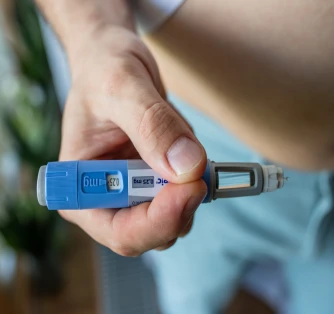Menu
Weight loss
Hormones
Sex
EXPLORE
MEET NU IMAGE MEDICAL
TREATMENTS
MEET NU IMAGE MEDICAL
TREATMENTS
MEET NU IMAGE MEDICAL
Tirzepatide vs. Semaglutide: What are the differences for weight loss?


Obesity rates are climbing worldwide, prompting a search for effective treatments. Two medications, Tirzepatide (Mounjaro) and Semaglutide (Ozempic, Wegovy), have emerged as powerful tools for weight loss. Both belong to a class of drugs called GLP-1 receptor agonists, but Tirzepatide also activates the GIP receptor, which may offer additional benefits.
What is Semaglutide?
Semaglutide was initially developed for type 2 diabetes, but its weight loss potential quickly became apparent. It mimics a hormone that regulates blood sugar and appetite, leading to reduced calorie intake and weight loss. Semaglutide is available under brand names like Ozempic (for diabetes) and Wegovy (specifically for weight loss).
How does Semaglutide work?
Semaglutide works by mimicking a hormone called GLP-1 (glucagon-like peptide-1) that your body naturally produces after eating. GLP-1 plays a key role in regulating your appetite and blood sugar levels.
When you take Semaglutide, it acts like GLP-1, sending signals to your brain that make you feel full and satisfied. This can help you eat less and reduce your overall calorie intake. Additionally, it slows down how quickly your stomach empties, further increasing your feeling of fullness.
Semaglutide also stimulates your pancreas to release more insulin, which helps lower blood sugar levels. Over time, these combined effects can lead to significant and sustained weight loss.
What is Tirzepatide?
Tirzepatide is a newer medication that targets both GLP-1 and GIP receptors. This dual action is thought to enhance its effects on appetite, metabolism, and blood sugar control, potentially leading to greater weight loss than Semaglutide alone.
How does Tirzepatide work?
Tirzepatide works by imitating two natural hormones, GLP-1 and GIP, that your body produces after eating. By mimicking GLP-1, it tells your pancreas to release insulin, helping regulate blood sugar. This can lead to eating less and, over time, losing weight.
In addition to mimicking GLP-1, Tirzepatide also mimics GIP, a hormone involved in controlling energy use and fat storage. Activating GIP receptors is thought to increase the number of calories you burn and promote the breakdown of fat, contributing further to weight loss.
This unique dual action sets Tirzepatide apart from other weight loss medications and may be why it's shown to be so effective in clinical trials.
Do they work for weight loss?
Both Semaglutide and Tirzepatide have demonstrated significant efficacy in promoting weight loss in clinical trials. Studies have shown that individuals using these medications can achieve an average weight loss of 15-20% or more over a year. Of course, individual results may vary.
How do Tirzepatide and Semaglutide compare in studies?
Head-to-head studies comparing Tirzepatide and Semaglutide suggest that Tirzepatide may lead to slightly greater weight loss than Semaglutide.
“Using Tirzepatide resulted in a weight loss of 17.8% (95% CI: 16.3%-19.3%) compared with 12.4% (95% CI: 11.5%-13.4%) for Semaglutide”.
However, more research is needed to confirm these findings. It's important to note that both medications are highly effective, and the choice between them may depend on individual factors, preferences, and medical suggestions.
How do side effects compare between Tirzepatide and Semaglutide?
Both Tirzepatide and Semaglutide are effective weight-loss medications, but they can come with potential side effects.
Semaglutide side effects:
Semaglutide is generally well-tolerated, but like any medication, it can cause side effects. The most common ones are:
Gastrointestinal Issues:
-
Nausea
-
Vomiting
-
Diarrhea
-
Constipation
-
Stomach pain
-
Gas/Bloating
Other potential side effects:
-
Headache
-
Fatigue
-
Dizziness
-
Changes in taste
-
Injection site reactions (redness, pain, itching)
Rare but serious side effects:
-
Gallbladder problems
-
Kidney problems
-
Changes in vision
Tirzepatide side effects:
Tirzepatide, like Semaglutide, is generally well-tolerated but can cause side effects. The most common are gastrointestinal issues: nausea, vomiting, diarrhea, constipation, stomach pain, etc. Other potential side effects include headache, fatigue, dizziness, changes in taste, injection site reactions, and low blood sugar.
Rare but serious side effects include pancreatitis, gallbladder problems, kidney problems, allergic reactions, and vision changes. Tirzepatide may have a slightly higher incidence of gastrointestinal side effects than Semaglutide, particularly at higher doses.
Most side effects with both medications are mild and improve over time. If you experience any concerning or persistent side effects, it's crucial to consult with your doctor for further evaluation and guidance.
Cost of Tirzepatide vs. Semaglutide
Both Tirzepatide and Semaglutide can be expensive, and insurance coverage may vary. Generally, TirzepatideIt may be a little more expensive than Semaglutide. Manufacturer coupons or patient assistance programs may be available to help offset costs.
Which one is right for you?
The best choice for you will depend on your individual health needs, goals, preferences, and financial situation. Talk to your doctor to weigh the pros and cons of each medication and determine which one aligns best with your circumstances.
Remember, both medications offer a powerful tool to help you achieve significant and sustained weight loss. By making an informed decision, you can take a positive step toward improving your health and well-being.
This article is for informational purposes only and does not constitute medical advice. The information contained herein is not a substitute for and should never be relied upon for professional medical advice. Always talk to your physician about the risks and benefits of any treatment. Nu Image Medical may not offer the medications or services mentioned in this article.
